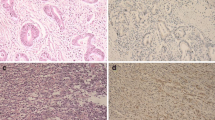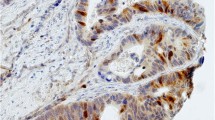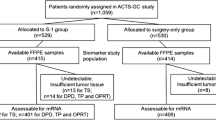Abstract
Purpose
We investigated whether the intensity of thymidylate synthase (TS) staining in tissue samples obtained from gastric cancer (GC) patients undergoing gastrectomy could predict response to 5-FU-based adjuvant chemotherapy after gastrectomy.
Method and materials
Clinicopathological features of 124 patients with histologically proven GC who underwent radical gastrectomy were retrospectively reviewed. Tissue samples obtained from these patients were immunohistochemically stained for assessing TS expression. We arbitrarily classified the TS staining results as low (<20% cytoplasmic immunostaining) and high (≥20% cytoplasmic immunostaining) TS expression.
Results
The clinicopathological features of the low TS expression group patients were typically similar to those of the high TS expression group patients. However, multivariate forward stepwise logistic regression analysis revealed that low TS expression was independently associated with females and responders to 5-FU-based adjuvant chemotherapy. The median follow-up duration for the 124 GC patients who had undergone curative resection was 41.3 months. The GC patients who showed poor tumor differentiation and high TS expression had short disease-free survival (DFS) and overall survival (OS).
Conclusions
Low TS expression is significantly associated with female GC patients and responders to 5-FU-based adjuvant chemotherapy. It predicts longer DFS and OS in selected GC patients treated with 5-FU-based adjuvant chemotherapy after curative resection. The results suggest that prospective assessment of TS staining intensity in tissue samples obtained from GC patients undergoing gastrectomy would be useful to predict the patients who would be benefited from 5-FU-based adjuvant chemotherapy after gastrectomy.



Similar content being viewed by others
References
Department of Health, Executive Yuan, Taiwan (2007) Annual report of cancer registration
Yokota T, Kunii Y, Teshima S, Yamada Y, Saito T, Takahashi M, Kikuchi S, Yamauchi H (1999) Clinicopathologic prognostic features in patients with gastric cancer associated with esophageal or duodenal invasion. Ups J Med Sci 104(3):217–229
Hermans J, Bonenkamp JJ, Boon MC et al (1993) Adjuvant therapy after curative resection for gastric cancer: meta-analysis of randomized trials. J Clin Oncol 11:1441–1447
Hermans J, Bonenkamp JJ (1994) In reply. J Clin Oncol 12:879–880
Nakajima T, Ohta K, Ohyama S, Hamajima N (1999) Meta-analysis of adjuvant chemo-therapy trials for gastric cancer at the Cancer Institute Hospital, Tokyo. In: Nakajima T, Yamaguchi T (eds) Multimodality therapy for gastric cancer. Springer-Verlag, Tokyo, pp 27–31
Earle CC, Maroun JA (1999) Adjuvant chemotherapy after curative resection for gastric cancer in non-Asian patients: revisiting a meta-analysis of randomized trials. Eur J Cancer 35:1059–1064
Mari E, Floriani I, Tinassi A et al (2000) Efficacy of adjuvant chemotherapy after curative resection for gastric cancer: a metaanalysis of published randomized trials. Ann Oncol 11:837–843
Panzini I, Gianni L, Fattori PP et al (2002) Adjuvant chemotherapy in gastric cancer: a meta-analysis of randomized trials and a comparison with previous meta-analyses. Tumori 88:21–27
Macdonald JS, Smalley SR, Benedetti J et al (2001) Chemoradiotherapy after surgery compared with surgery alone for adenocarcinoma of the stomach or gastroesopha-geal junction. N Engl J Med 345:725–730
Cunningham D, Allum WH, Stenning SP et al (2006) Perioperative chemotherapy versus surgery alone for resectable gastroesophageal cancer. N Engl J Med 355:11–20
Macdonald JS, Smalley SR, Benedetti J, et al. Postoperative combined radiation and chemotherapy improves disease free survival (DFS) and overall survival (OS) in resected adenocarcinoma of the stomach and G.E. junction: update of the results of Intergroup Study INT-0116 (SWOG9008). Presented at the 2004 Gastrointestinal Cancers Symposium, San Francisco, January 22–24, 2004. Abstract.
Hundahl SA, Macdonald JS, Benedetti J, Fitzsimmons T (2002) Surgical treatment variation in a prospective, randomized trial of chemoradiotherapy in gastric cancer: the effect of undertreatment. Ann Surg Oncol 9:278–286
Sakuramoto S, Sasako M, Yamaguchi T et al (2007) Adjuvant chemotherapy for gastric cancer with S-1, an oral fluoropyrimidine. N Engl J Med 357:1810–1820
Ajani JA (2005) Evolving chemotherapy for advanced gastric cancer. Oncologist 10(Suppl 3):49–58
Ng K, Meyerhardt JA, Fuchs CS (2007) Adjuvant and neoadjuvant approaches in gastric cancer. Cancer J 13:168–174
Diasio RB, Johnson MR (2000) The role of pharmacogenetics and pharmacogenomics in cancer chemotherapy with 5-fluorouracil. Pharmacology 61:199–203
Ichikawa W (2006) Prediction of clinical outcome of fluoropyrimidine-based chemotherapy for gastric cancer patients, in terms of the 5-fluorouracil metabolic pathway. Gastric Cancer 9:145–155
Ma T, Zhu ZG, Ji YB, Zhang Y, Yu YY, Liu BY, Yin HR, Lin YZ (2004) Correlation of thymidylate synthase, thymidine phosphorylase and dihydropyrimidine dehydrogenase with sensitivity of gastrointestinal cancer cells to 5-fluorouracil and 5-fluoro-2′-deoxyuridine. World J Gastroenterol 10:172–176
Ishida Y, Kawakami K, Tanaka Y, Kanehira E, Omura K, Watanabe G (2002) Association of thymidylate synthase gene polymorphism with its mRNA and protein expression and with prognosis in gastric cancer. Anticancer Res 22:2805–2809
Lenz HJ, Leichman CG, Danenberg KD et al (1996) Thymidylate synthase mRNA level in adenocarcinoma of the stomach: a predictor for primary tumor response and overall survival. J Clin Oncol 14:176–182
Johnston PG, Lenz HJ, Leichman CG et al (1995) Thymidylate synthase gene and protein expression correlate and are associated with response to 5-fluorouracil in human colorectal and gastric tumors. Cancer Res 55:1407–1412
Horishoki T, Danenberg KD, Stadbauer THW et al (1992) Quantitation of thymidylate synthase, dihydroreductase and DT-diaphorose gene expression in human tumors using the polymerase chain reaction. Cancer Res 52:108–116
Leichman L, Lenz HJ, Leichman CG, Goshen S et al (1995) Quantitation of intratumoral thymidylate synthase expression predicts for resistance to protracted infusion of 5-fluorouracil and weekly leucovorin in disseminated colorectal cancers: preliminary report from an ongoing trial. Eur J Cancer 31A:1306–1310
Boku N, Chin K, Hosokawa K et al (1998) Biological markers as a predictor for response and prognosis of unresectable gastric cancer patients treated with 5-fluorouracil and cis-platinum. Clin Cancer Res. 4:1469–1474
Yeh KH, Shun CT, Chen CL et al (1998) High expression of thymidylate synthase is associated with the drug resistance of gastric carcinoma to high dose 5-fluorouracil-based systemic chemotherapy. Cancer 82:1626–1631
Kawakami K, Graziano F, Watanabe G et al (2005) Prognostic role of thymidylate synthase polymorphisms in gastric cancer patients treated with surgery and adjuvant chemotherapy. Clin Cancer Res 11(10):3778–3783
Kuniyasu T, Nakamura T, Tabuchi Y, Kuroda Y (1998) Immunohistochemical evaluation of thymidylate synthase in gastric carcinoma using a new polyclonal antibody: the clinical role of thymidylate synthase as a prognostic indicator and its therapeutic usefulness. Cancer 83:1300–1306
Suda Y, Kuwashima Y, Tanaka Y, Uchida K, Akazawa S (1999) Immunohistochemical detection of thymidylate synthase in advanced gastric cancer: a prognostic indicator in patients undergoing gastrectomy followed by adjuvant chemotherapy with 5-fluoropyrimidines. Anticancer Res 19:805–810
Kim JP, Kwon OJ, Oh ST, Yang HK (1992) Results of surgery on 6589 gastric cancer patients and immunochemosurgery as the best treatment of advanced gastric cancer. Ann Surg 216:269–279
Nakazato H, Koike A, Saji S, Ogawa N, Sakamoto J (1994) Efficacy of immunochemotherapy as adjuvant treatment after curative resection of gastric cancer. Lancet 343:1122–1126
Kelsen DP (1996) Adjuvant and neoadjuvant therapy for gastric cancer. Semin Oncol 23:379–389
Wils J (1996) The treatment of advanced gastric cancer. Semin Oncol 23:397–406
Kim SY, Park HC, Yoon C, Yoon HJ, Choi YM, Cho KS (1998) OK-432 and 5-fluorouracil, doxorubicin, and mitomycin C (FAM-P) versus FAM chemotherapy in patients with curatively resected gastric carcinoma: a randomized phase III trial. Cancer 83:2054–2059
Choi JH, Lim HY, Nam DK et al (2001) Expression of thymidylate synthase in gastric cancer patients treated with 5-fluorouracil and doxorubicin-based adjuvant chemotherapy after curative resection. Br J Cancer 84(2):186–192
Shiu MH, Perrotti M, Brennan MF (1989) Adenocarcinoma of the stomach: a multivariate analysis of clinical, pathologic and treatment factors. Hepatogastroenterology 36:7–12
Carneiro F, Seixas M, Sobrinho-Simoes M (1995) New elements for an updated classification of the carcinomas of the stomach. Path Res Pract 191:571–584
Macdonald JS, Fleming TR, Peterson RF et al (1995) Adjuvant chemotherapy with 5-FU, adriamycin, and mitomycin-C (FAM) versus surgery alone for patients with locally advanced gastric adenocarcinoma: a Southwest Oncology Group study. Ann Surg Oncol 2:488–494
Yu CCW, Levison DA, Dunn JA et al (1995) British Stomach Cancer Group trial of adjuvant therapy in resectable gastric cancer. Br J Cancer 71:1106–1110
Setälä LP, Kosma V-M, Marin S et al (1996) Prognostic factors in gastric cancer: the value of vascular invasion, mitotic rate and lymphoplasmacytic infiltration. Br J Cancer 74:766–772
Stelzner S, Emmrich P (1997) The mixed type in Lauren’s classification of gastric carcinoma: histologic description and biologic behavior. Gen Diagn Pathol 143:39–48
Johnston PG, Fisher ER, Rockette HE et al (1994) The role of thymidylate synthase expression in prognosis and outcome of adjuvant chemotherapy in patients with rectal cancer. J Clin Oncol 12:2640–2647
Pestalozzi BC, Peterson HF, Gelber RD et al (1997) Prognostic importance of thymidylate synthase expression in early breast cancer. J Clin Oncol 15:1923–1931
Author information
Authors and Affiliations
Corresponding author
Rights and permissions
About this article
Cite this article
Yeh, CN., Jung, SM., Chen, TW. et al. Expression of thymidylate synthase determines the response of gastric cancer patients undergoing gastrectomy to 5-fluorouracil-based adjuvant chemotherapy. Langenbecks Arch Surg 395, 217–225 (2010). https://doi.org/10.1007/s00423-009-0573-x
Received:
Accepted:
Published:
Issue Date:
DOI: https://doi.org/10.1007/s00423-009-0573-x




